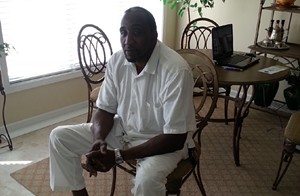
- Courtesy of Gilbert Johnson
- Kenneth Johnson
Facing questions from lawmakers about a pair of crises in Vermont's Department of Corrections, interim Commissioner Jim Baker on Thursday pledged to reform what he characterized as a troubled institution.
"There's an element of thought inside Corrections that the people that come into our custody somehow don't deserve the respect and dignity that all human beings deserve," Baker
told members of the Joint Legislative Justice Oversight Committee. "That culture needs to change."
The commissioner was referring specifically to
the death last December of Kenneth Johnson, a Black inmate who died of a misdiagnosed and untreated tumor at a northern Vermont prison.
Multiple reports have found that Corrections staff and medical contractors ignored Johnson's pleas for help in the hours before he died, and the state's chief medical examiner said
the incident could constitute criminal neglect.
"This was unacceptable and avoidable," Baker said. He told committee members that he had recently learned that 45 Vermont inmates had died in state custody in the past decade and that his department had not complied with
a 2006 policy requiring an administrative review after each death.
"That is the cultural [problem] that I'm talking about," he said. "I was lost for words when I found out that [there were] 45 deaths in 10 years and our policy is 14 years old. Unacceptable. Unacceptable."
Baker also addressed the ongoing crisis at a private prison in Mississippi that houses 219 Vermont inmates. His department announced on Wednesday that
147 of them have now tested positive for COVID-19. "I don't need to tell all of you this is a grave situation, and I'm very concerned," he said at Thursday's hearing.
While Baker reserved his harshest words for CoreCivic, the private prison contractor that operates the Tallahatchie County Correctional Facility, he also appeared to express frustration with his own department's supervision of its out-of-state prison population.
“I’ve been pretty loud and clear in the last week about accountability and how that works," Baker said. "If I’m willing to stand up at a press conference and say I own the responsibility of what’s going on in Mississippi, I expect everybody else in the organization to own what they own and stop trying to work their way around it by finding every excuse under the sun not to own it. And that’s what accountability is.”
Lawmakers and Baker's fellow witnesses appeared to agree with the commissioner's assessment of Corrections, which has been under intense scrutiny since
Seven Days reported a series of allegations against the department last December. At the state's request, the law firm Downs Rachlin Martin has been conducting an independent investigation of those allegations, which focused on Vermont's women's prison, and of Johnson's death.
"I think we all are looking for a cultural shift in Corrections," said Sen. Dick Sears (D-Bennington), who chairs the committee. Referring to Johnson's death, he said, "This should be a wake-up call to all of us."
Defender General Matthew Valerio, whose Prisoners' Rights Office authored
a damning report on Johnson's death, told the committee that Corrections had failed for years to provide adequate medical care to inmates. "The bottom line is that complaints are generally not treated with the type of urgency and seriousness that you would expect," he said, adding that Corrections staffers routinely obstructed his office's attempts to gather information.
Steve Howard, executive director of the Vermont State Employees' Association, said that members of his union had been "calling for cultural change in the Department of Corrections for years." Low standards for correctional officers, long hours, low pay and staff churn have been "killing" the department, Howard said.
He defended its rank-and-file members and said leadership was to blame.
"Serious reform has to come to central office," Howard said, referring to those who lead the department from its Waterbury headquarters. "There is no relationship between our members and central office. They don't trust them. They don't believe them. They don't know what they do half the time. And they think that central office has no idea what it's like to work in the facility, no idea what it's like to work in the field. And, in fact, they will say, 'We haven't seen anybody from central office for years in this facility.'"
Lawmakers appeared particularly concerned that, as Baker told the committee, no staffers have faced discipline over Johnson's death. "Here we are, August, eight months later, and nothing has happened to the employees," Sears said. "What do we think is going to change in terms of attitude if you can threaten a man who's dying with isolation and other threats and tell him to go back to his cell and nothing happens? That just — it boggles my mind."
Rep. Mary Hooper (D-Montpelier) said she shared Sears' concerns and was tired of hearing the same excuses from Corrections. "We've heard this before: 'We've got it. We're changing it.' And we're not seeing those changes," she said. "So I'm very impatient to get there."
Sears said he hoped the legislature would take action as soon as it reconvened in August, but it wasn't entirely clear what action lawmakers might take. Valerio has called on the legislature to restore a full-time, in-house medical director to the department's budget. But according to Baker, the position still exists; he just hasn't been able to fill it. Instead, the department is relying on a part-time medical director borrowed from the Department of Vermont Health Access.
Panel members appeared supportive of Howard's call for better pay and higher standards for correctional officers, but they acknowledged that such a proposition would be expensive. According to Howard, it would be worth the price. "If we want better outcomes, we have to invest," he said.
Baker said he was already tackling cultural problems within his department, in part by creating an Office of Professional Standards. He said he had ordered up a new hiring plan that includes background investigations and a psychological test. And he said he would soon hold a meeting of department managers to deliver the message that "the culture
is gonna change. And if people aren't on board with that, then they're going to have to be thinking about other options."

















Comments
Comments are closed.
From 2014-2020, Seven Days allowed readers to comment on all stories posted on our website. While we've appreciated the suggestions and insights, right now Seven Days is prioritizing our core mission — producing high-quality, responsible local journalism — over moderating online debates between readers.
To criticize, correct or praise our reporting, please send us a letter to the editor or send us a tip. We’ll check it out and report the results.
Online comments may return when we have better tech tools for managing them. Thanks for reading.